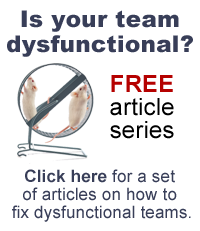Learning to say yes to change

The Globe and Mail, Career Section, Wednesday March 9, 2011
Mentor Minute>> Quick Career Advice from Expert Katie Bennett
MENTOR MINUTE: Learning to say yes to change
Start with small things you resist and build your way up to accept bigger challenges.
The Scenario:
I got feedback from a manager in a recent performance review that I resist everything too much. And there is truth to that because whether it is feedback at work, or cleaning my office, I’m prone to resisting change. What can I do to be more open to options and avoid holding back?
The Advice:
This reminds me of the old Star Trek line “Resistance is futile!” And it’s true. Sometimes resistance is important (for example when your “gut” says no to something risky), chronic resistance can be very limiting to your career.
Whether you like it or not, eventually you will need to listen to the feedback you are given or you will never grow as an employee or a leader. The longer you resist relatively simple suggestions, the more the problem grows, and the more mental clutter it creates.
This ends up becoming exhausting.
Recently a client came to a coaching meeting with a story illustrating her chronic resistance. I challenged her to start observing herself with this question: “What am I resisting?” She came to the next coaching call with an interesting account. She had received feedback from her manager about a presentation that she and a colleague were preparing. The feedback was not good, and they had to go back to the drawing board several times. Each time, she resisted immensely, got angry at her manager, pushed back and said she really didn’t get it.
But her manager persisted, and eventually she took the feedback to heart. By dropping her shield, a breakthrough in thinking occurred. The presentation went from boring, predictable and too long, to succinct, insightful and outstanding. They received amazing feedback from everyone, including some very senior people in the room.
Breaking down the walls of resistance can be challenging, but it can be done, and it starts with realization:
What are you resisting?
The first thing to take note of is what kind of things are you resisting? Feedback? Change? Making decisions? Key relationships? Once you can pinpoint the source of your resistance, you can come up with a plan on how to stop doing it.
Envision embracing change.
Change in the workplace is a constant, and often the greatest source of resistance. Most of spend way too much energy trying not to change. But take a moment and consider what it would be like to stop resisting change so much. What would it be like to be more open to doing things a new way, or trying new things? What’s the upside? What would your relationships be like? How might your career advance if you were more open to change?
Start small and safe
Start with something relatively safe to start to break down the resistance. If you’re known for a messy office, for example, this is a great place to start: it doesn’t involve anyone else, so there if no risk of making a “mistake”. Commit the time to get the cleanup done, then do it. Then take note of the impact of taking this one simple action: What difference did it make to clear out this mental and physical clutter?
Build up to bigger things
What other easy decisions can you make? Often, when resistance has become a way of life, even the easiest decisions become convoluted and hard. Should I be at that meeting on Tuesday? Should I incorporate the feedback from my boss on this presentation, or fight it? Do I want to go to a movie Thursday night? Look around your work and life for places where you can make some quick decisions – don’t even give your resistance time to settle in.
Once you have flexed some of these new muscles, you may find your tendency to hold back begins to fade away. Then start tackling some of the larger areas where you resist.
Katie Bennett is a career coach and speaker and is president of Double Black Diamond Coaching in Vancouver and an associate coach for The Ken Blanchard Companies.






